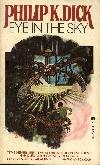|
Eye In The Sky
After an accident lands Jack Hamilton, his wife and six other tourists on top of a radiation charged particle accelerator, the group begins a journey through their own separate minds and realities. Being trapped in the worlds of a crackpot racist and a self-absorbed socialite is just the beginning of this other-worldly journey. While there are many familiar elements to Hamilton and crew, in these worlds anything can and does happen. Just when they think they understand their predicament, the group is placed in a more confounding situation. The dark realities these characters must face are filled with ironies. Stereotypes become reality and deep-rooted perceptions create nightmarish situations for the eight person group. Eye In The Sky is filled with many classic Dickian situations and themes. There is an encounter with God at the center of the universe, a house that devours people to survive and a world where people are showered with locusts for telling a lie. Dick craftsfully leaves the reader vulnerable by altering the laws of time, physics and ultimately perception. The characters in Eye In The Sky are distinctive. While they all appear very normal on the surface, dark secrets lurk in the recesses of their minds. Eye In The Sky is a perfect example of Dick's brand of speculative fiction. It questions the stability of people's belief system and shatters the trust placed in human senses. Philip K. Dick has created a masterpiece in Eye In The Sky. This novel should not be overlooked as one his important works.
Proceed with caution.
This story was written by a young Philip Dick, just beginning to discover his own style especially for the novel. He creates a story that makes profound sense in a context where logic and rational perception are dismissed. This represents the true art of Dick's fiction and can be seen in many of his novels which followed Eye In The Sky. The philosophical issues of perception and personal world view are major themes of Eye In The Sky. Dick is sending a powerful message about perceptive reality and human disconnectedness. He is doubting whether people see their worlds in the same way. He's asking questions like "Who's to say what's real?", "Whose emotions are valid?" and "Just because we see it, is it there?". I especially enjoyed the many personality types that are exposed in this book. The suggestion is raised that some degree of insanity (however small) exists in every person's mind. The more "normal" they appear on the outside, the more fears they may harbor in their psyches. The real-world manifestations of these insecurites and fears are highly subjective. Dick takes the opportunity to point out the irony in the way religious groups (especially Christianity) try to manifest divine power in the real world. All the doctrine involving Arthur Silvester's Second Babiist Faith seems to highlight these inconsistencies. The only normal person in the book is the main character Jack Hamilton (and Marsha to some degree). This down on his luck working class electronics engineer has the only reliable viewpoint in the whole novel. It is through his eyes that we experience the story. To the other characters (especially Silvester, Pritchert, Reiss and McFeyffe), their psychotic self-absorbed worlds don't seem strange. Jack (and Marsha) are able to view the situations objectively and see how out of touch the other characters are with the "real world", the reality where they are lying on the Bevatron. The progression from the egocentric but mildly harmless universe of Arthur Silvester to the nightmarish worlds of Joan Reiss and McFeyffe serves to build tension and create a highly dramatic storyline. The final plot twist where McFeyffe is revealed as the traitor he's trying to expose is shocking, devilishly clever and logical in this subjective reality. The political statements Dick is making in the final scenes of Eye In The Sky are very intriguing. He suggests that communists and right-wing government officials are similar guises behind which power-hungry individuals hide. While these political philosophies are radically different in content, the motives which drive many adherents are not so foreign. McFeyffe the top-level military strategist and McFeyffe the communist informant are the same character. One who thrives off the strength of his convictions. Like Bob Arctor in A Scanner Darkly, the dual personalities blur into one. The distinction vanishes and the selfish motives reveal themselves. Philip K. Dick also comments on the self-absorbed nature of wealthy society through the vision of Edith Pritchert. Her love for arts and high culture make her blind to the workings of the real world. She thinks everything she perceives exists for her comfort and pleasure. She has no concept or appreciation for these things on her own. She simply believes what society has taught her is fine art and lacks and sense of individuality. The only disappointment in Eye In The Sky was the final ending. Where did the idea of Hamilton and Laws starting a record company? This is the only part that seems disconnected from the rest of the novel. Despite the awkward closing, Eye In The Sky is a terrific novel that ranks among my top five PKD books. He expresses many profound ideas in a story that makes sense even with all it's metaphysical complications. With strong characters and a clever plot twist at the end, Eye In The Sky offers a psychologically challenging view of human perception.
|
